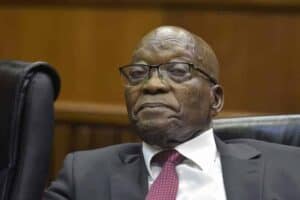A 92c per hour rise in the minimum wage is seen as both a relief for workers and a challenge for businesses in South Africa.

The proposed national minimum wage increase of 1.5% plus inflation for next year has been described as “bad news” for the economy, that would further affect the unemployed.
The National Minimum Wage Commission proposed the hike in minimum wages in a notice published in the Government Gazette this week.
The minimum wage currently stands at R27.58 per hour, but based on the November consumer price index (CPI) of 2.9%, the minimum wage for 2025 could be around R28.50.
Minimum wage could be around R28.50
The final amount would be calculated using the CPI at the time of implementation on 1 March.
Efficient Group chief economist Dawie Roodt described the hike as “bad news”, not only for the economy but the unemployed who still have to enter the job market at the lowest level.
Director of Pan-African Institute for Evidence and professor of practice at the University of Johannesburg Pali Lehohla said the decision to hike minimum wage was the right decision, but it would lead to serious job losses.
ALSO READ: The high cost of ignoring minimum wage
However, organised labour has welcomed the commission’s announcement as a step in the right direction. Cosatu parliamentary coordinator Matthew Parks said although it fell short, the increase was “still okay”.
This year’s March hike to R27.58 per hour – from R25.42 previously – sparked an outcry from business that complained about its negative impact on the economy and job retention as some employers, especially small enterprises, would not afford it.
“Every year this happens, but we are basically making it more difficult for the over 10 million unemployed people to get jobs, because jobs are simply priced out of the market for them,” said Roodt.
Jobs priced out of market
“People will employ workers illegally because often businesses can’t pay the minimum wage.
“In fact, we shouldn’t have a minimum wage any more and certainly it cannot increase more than the inflation rate because that in itself is inflationary, which means the Reserve Bank would have to keep the interest rates relatively high for longer.
“This is bad news for an economy with such high levels of unemployment and that still has inflationary issues,” Roodt said.
ALSO READ: Candidate attorneys minimum wage to start from R6 000
The economist expected organised labour to accept the increase because they represented those with actual jobs, but not the unemployed who would suffer the most as a result of the hike.
Lehohla said the increase would lead to serious job losses as has happened to domestic workers in successive Quarterly Labour Force surveys.
The economist, who is also former statistician-general of SA, said the consequences were going to be dire for that category.
Dire consequences
“But the question should rather be what should we do to make South Africa’s economy work and make the minimum wage not only desirable, but also implementable,” said Lehohla.
“While the minimum wage is currently necessary, the reality is that it is unimplementable. Especially at domestic worker level, as more will face the wall.
“So what has government achieved? It is kicking the can down the dark alley and creating chaos in the household sector of the economy.”
ALSO READ: ‘They are heavily exploited’: Samwu wants permanent employment for EPWP workers
Cosatu’s Parks said although the federation had tabled a slightly higher proposal to the commission, it was pleased that its demand for a positive above-inflation increase had prevailed.
“This increase will help workers to take care of their families. It will inject stimulus into the economy, spurring growth and creating badly needed jobs.
“It will provide relief to six million workers earning within the minimum wage range – in particular farm, domestic, construction, retail, hospitality, transport, security and cleaning workers,” he said.
Helping workers
The commission has asked for public comments by 14 January, which would be processed before being given to the minister of employment and labour for approval.
Parks said Cosatu regarded the national minimum wage as one of President Cyril Ramaphosa’s most important transformational achievements. It began at R20 per hour in 2019, with R15 for domestic workers and R19 for farmworkers.
Farmworkers and domestics now earn equal to the minimum wage level.
NOW READ: ‘They’re working for transport and food’: Samwu wants 15% or R4 000 top-up






